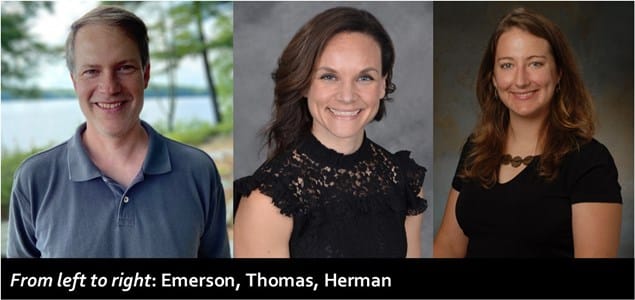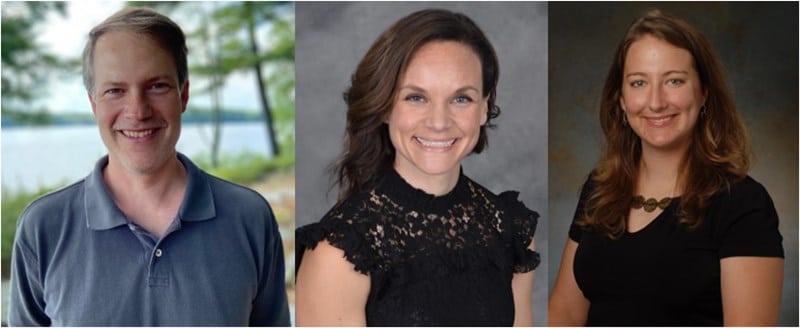The CUR Biology Division announces the 2021 recipients of its mentor awards and small research grants. The division’s mentor awards recognize exemplary biology mentors for their long-term efforts in supervising undergraduate researchers, and its grants of up to $250 each seek to nurture mentored undergraduate research projects that could benefit significantly from a small grant.

Early- and Mid-Career Mentor Awardees
City College of New York-CUNY Associate Professor of Biology Mark Emerson (early career) earned his PhD at Harvard University in neurobiology and conducted his postdoctoral work at Harvard Medical School. His approach to mentoring diverse undergraduate researchers reflects each student’s individuality and need for guidance while modeling a love of science, yielding 20 conference presentations with 47 undergraduates, 11 student honors, and 9 students enrolled in advanced degree programs. Dr. Emerson spearheads a science outreach program in which his undergraduates return to their middle schools to lead hands-on experiences, thereby equipping his students with mentoring skills and extending the mentoring model to future undergraduates.
North Carolina A&T State University Associate Professor of Biology Misty Thomas (early career) earned her undergraduate degree from the Collège Universitaire de St. Boniface and her PhD in microbiology at the University of Manitoba and conducted her postdoctoral work at the National Institute of Environmental Health Sciences of the National Institutes of Health. Her course-based undergraduate research experiences and mentoring of more than 20 undergraduate researchers over the past 5 years have yielded peer-reviewed scientific articles coauthored by undergraduates, numerous conference presentations, and students who have gone on to graduate/professional schools. Dr. Thomas’s mentoring approach involves individual development plans that prioritize the goals, needs, and expectations of her diverse mentees.
St. John Fisher College Associate Professor of Biology Maryann Herman (mid-career) earned her BS at Allegheny College and her PhD at Cornell University, focusing on plant pathology. She has mentored more than 60 undergraduates, with more than 70 percent presenting at scientific meetings and 75 percent pursuing advanced degrees. Dr. Herman engages in professional development opportunities to enhance her mentoring skills and promotes a model in which the mentor and mentees work, learn, and reflect on science together, and mentees take ownership of their research question.
Awardees, Small Research Grants
Corey Cleland (associate professor of biology, James Madison University), “Identification of Muscle Synergies in the Rat Tail.” The project presents a novel approach that combines behavioral measurements to computationally identify potential patterns of muscle activity leading to a better understanding of synergies.
Drew Crain (professor of biology, Maryville College),

Effect of Cannabidiol (CBD) on Xenopus laevis Developing Liver and Skin.” The project examines the role of CBD in the amphibian model organism Xenopus laevis, which may offer implications for addressing inflammatory diseases and illnesses.
Andrew Merwin (assistant professor of zoology, Baldwin Wallace University), “Characterizing Arboreal Arthropod Communities along a Gradient of Urbanization.” The project samples arthropods on native tree species throughout Cleveland that vary in their degree of urbanization. The research may offer implications for landscaping decisions.
Abigail Neyer (assistant professor of biology, University of North Georgia, in collaboration with Jennifer Mook and Natalie Hyslop), “Investigating the Effects of Winter Temperature Patterns on Overwintering Eastern Box Turtles (Terrapene carolina).” The project will characterize the effects of winter temperatures on the overwintering behaviors of the vulnerable eastern box turtle (Terrapene carolina).
Tara Pelletier (assistant professor of biology, Radford University), “Population Genetics of a Caddisfly (Glossosomatidae).” The project will collect DNA sequence data to estimate the genetic diversity and connectivity among populations of a species of caddisfly throughout several tributaries within the New River watershed in the southern Appalachians of Virginia. The project shows promise for providing insight on the ecosystem health of the region.

Tara Rajaniemi (professor of biology, University of Massachusetts Dartmouth), “Root Growth Responses to Soil Microbial Communities.” The project collects plants and soil from the field to culture soil microbial communities in pots in a greenhouse, conducting experiments to test their effects on plant fitness and ascertain whether root growth responds to the presence of harmful or beneficial microbes.
Bisi Velayudhan (assistant professor of biology, James Madison University), “Cumulative Effects of Sodium Benzoate, a Food Preservative, on Gut Mucosal Immunity.” The project investigates the effect of sodium benzoate (SB) on gut mucosal immunity in the ileum of mice. The aims are to determine the effect of SB on goblet cell index, amount of mucin production, Paneth cell index, and Paneth cell granular density in the ileum.
Founded in 1978, the Council on Undergraduate Research (CUR) focuses on providing high-quality and collaborative undergraduate research, scholarly, and creative activity. Among the many activities and networking opportunities that CUR provides, the organization also offers support for the professional growth of faculty and administrators through expert-designed institutes, conferences, and a wide-range of volunteer positions. The CUR community, made up of nearly 700 institutions and 13,000 individuals, continues to provide a platform for discussion and other resources related to mentoring, connecting, and creating relationships centered around undergraduate research. CUR’s advocacy efforts are also a large portion of its work as they strive to strengthen support for undergraduate research. Its continued growth in connections with representatives, private foundations, government agencies, and campuses world-wide provides value to its members and gives voice to undergraduate research. CUR is committed to inclusivity and diversity in all of its activities and our community.
CUR focuses on giving a voice to undergraduate research with learning through doing. It provides connections to a multitude of campuses and government agencies, all while promoting networking and professional growth to its community.


